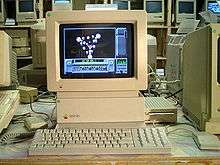Timeline of the Apple II family
This timeline of Apple II Family models lists all major types of Apple II computers produced by Apple Computer in order of introduction date. The Apple I, Apple III and Apple Lisa are included, even though they are not classed as part of the Apple II series (or a Macintosh), because of their unique role in Apple's product lineup of the era.

See also: Timeline of Macintosh models and Timeline of Apple products
Text timeline
The Apple Lisa does not support Apple II software, but shares common hardware. The Apple IIe Card requires a Macintosh LC for operation. Both are shaded to indicate their unique status on this timeline. The Apple I and Apple III both run Apple II software natively, classifying them as Apple II family computers except in name for the purposes of this timeline.

Apple I
| Year | Launched | Model | Family | Discontinued |
|---|---|---|---|---|
| 1976 | July 1 | Apple I | Apple I | September 1, 1977 |
| 1977 | April 1 | Apple II | Apple II | June 1, 1979 |

Apple II
| 1979 | June 1 | Apple II Plus | Apple II | December 1, 1982 |
| Apple II EuroPlus | Apple II | December 1, 1982 | ||
| Apple II J-Plus | Apple II | December 1, 1982 | ||
| Bell & Howell | Apple II | December 1, 1982 |
| 1980 | September 1 | Apple III | Apple III | December 1, 1981 |

Apple III
| 1981 | December 1 | Apple III Revised | Apple III | December 1, 1983 |
| 1983 | January 1 | Apple IIe | Apple II | March 1, 1985 |
| Apple Lisa | 68000 | January 1, 1984 | ||
| December 1 | III+ | Apple III | April 1, 1984 |

Apple IIe
| 1984 | January 1 | Apple Lisa 2 (Macintosh XL) | 68000 | April 1, 1985 |
| April 1 | Apple IIc | Apple II | September 1, 1986 |
| 1985 | March 1 | Apple IIe Enhanced | Apple II | January 1, 1987 |

Apple IIc
| 1986 | September 1 | Apple IIGS | Apple II | October 1, 1989 |
| Apple IIc Memory Expansion | Apple II | September 1, 1988 |
| 1987 | July 1 | Apple IIe Platinum | Apple II | November 1, 1993 |

Apple IIGS
| 1988 | September 1 | Apple IIc Plus | Apple II | September 1, 1990 |
| 1989 | October 1 | Apple IIGS (1 MB, ROM 3)[1] | Apple II | December 1, 1992 |
| 1991 | March 1 | Apple IIe Card | Apple II | May 1, 1995 |
See also
- Timeline of Apple products – includes complete list of Apple II family peripherals and software sold by Apple
- Timeline of Macintosh models
- List of products discontinued by Apple Inc.
References
External links
- Specifications, Apple Computer, Inc.
- Steven Weyhrich, Apple II History, apple2history.org
- Glen Sanford, Apple History, apple-history.com
- Dan Knight, Computer Profiles, LowEndMac, Cobweb Publishing, Inc.
- Apple Product Design Timeline
| ||||||||||||||||||||||||||||||||||||||||||||||||||||||||||||||||||||||
This article is issued from Wikipedia - version of the 7/14/2016. The text is available under the Creative Commons Attribution/Share Alike but additional terms may apply for the media files.